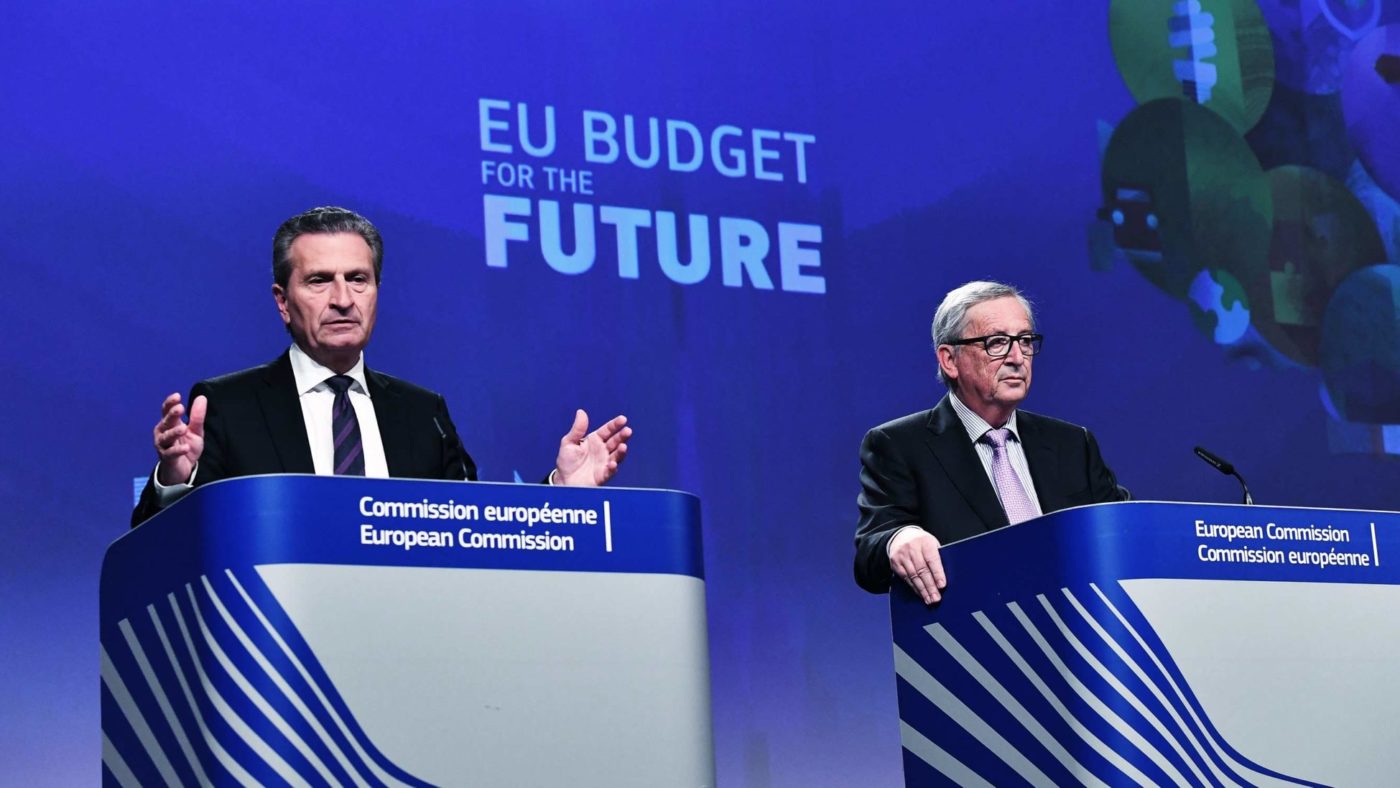Ninety-four billion euros. That’s the hole Brexit will leave in the next seven-year EU budget cycle.
When the European Commission started the debate on the next Multi-annual Financial Framework (MFF) a few weeks ago one of the biggest questions was how, or even whether, the Commission could cover the shortfall without making spending cuts.
Budget Commissioner Günther Oettinger outdid himself with his initial proposals, calling for an even bigger budget than the current one, despite the absence of a major contributor. In 2018 for instance, the EU will collect €145 bn. Astonishingly, the Commission wants that figure to rise to €178 bn a year from 2021-27.
Unsurprisingly many countries — including net contributors such as Austria, the Netherlands, Denmark, and Finland — were up in arms (as I chronicled here). But, says the Commission, there is no need for the naysayers to worry. After all, despite the budget getting even bigger, the contributions of member states will not increase at all — at least in total (which probably won’t calm down the aforementioned countries, given they still have to pay more as individual states).
National contributions account for €103 bn of this year’s budget, and, surprise, surprise, it will remain at exactly €103 bn on average in the proposal for the coming period. How can this be? How is it possible that revenue rises by €33 bn annually while contributions from the payers stay at the same total? The answer can be summed up in two words: own resources.
The Brussels elite has long dreamt of the EU collecting more of its own taxes. And while those proposals have always been slapped down by various member states out of fear of losing fiscal autonomy, the EU has nonetheless moved as close to collecting its own monetary resources as possible over time. Under the Commission’s plans, this currently tiny part of the budget will increase ever more, and should eventually account for a whopping 42 per cent of the €178 bn the EU wants to collect annually.
While traditional own resources such as VAT (first collected in 1980) remain in place, the Commission’s new proposals are for “a basket of new own resources”. Those additional resources are threefold: first, the Commission plans to bring in €12bn a year from a Common Consolidated Corporate Tax Base, which supposedly ought to ensure “fair taxation” (Brussels code higher and more harmonised taxes).
Their second wheeze is to get another €3bn from the European Emissions Trading System. That’s quite optimistic to say the least. After all, the Commission itself calculates that the “annual average revenues could vary between EUR 1.2bn and 3bn depending on the market price for EU Emission Trading System allowances”. But hey, if you are on the kind of monumental roll Brussels is currently on, you may as well assume you’ll get the maximum.
Finally, the EU wants to introduce fees based on non-recycled plastic packaging waste, in compliance with the big anti-plastic initiative the Commission introduced earlier this year. Interestingly enough, Oettinger’s original plan of a tax on plastic has been shelved after facing concerted opposition. In its proposal, the Commission itself admits that the “introduction of a dedicated new tax at EU level would be problematic from a competitiveness and subsidiarity angle”.
That’s why instead of a “tax” it wants to introduce “fees” in the form of an 80 cent charge for every kilogram of waste plastic. The Commission claims the scheme “could bring around €7bn per year” – though again it’s probably best to take their estimates with a pinch of salt.
So, in order not introduce an EU-wide plastic tax, i.e. having to pay for using plastic, the Commission instead proposes an EU-wide plastic fee, i.e. … having to pay for using plastic. How this policy will work with this week’s proposed ban on many plastic products, including forks and straws, is not entirely clear – after all, it would reduce the revenue so dearly needed for the budget.
To recap, the Commission is trying to plug the Brexit budget gap in the following ways: by hiding increases in member state contributions by focusing on the total amount of contributions; by moving forward on its tax harmonisation agenda; by asssuming the highest possible revenue from the emission trading allowances; and by introducing a “fee” instead of a tax on plastic.
If the Commission has people’s hackles up, just remember the European Parliament always tries to go one better than their colleagues from Berlaymont. While praising the Commission for trying to increase its own resources, MEPs are also demanding a financial transactions tax and a tax on digital companies. Of course, the Commission would be fully on board with this, especially on the digital tax, where they claim that “current corporate tax rules are inadequate for the digital economy” – that’s not actually true, as ECIPE’s Matthias Bauer has shown, digital companies pay more than their traditional peers.
Thankfully, in contrast to the Parliament, the Commission still retains a glimmer of realism. It’s important that member states must keep up the pressure to make sure the eurocrats see sense. Only then will they get a smaller budget for a smaller EU – and one without voodoo tricks to fill the Brexit hole.


